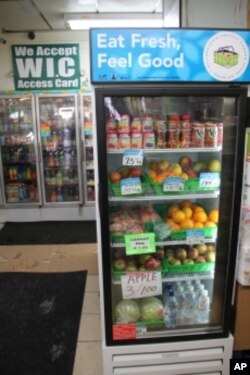There are more than 89,000 corner stores in the United States. Most are small, locally-owned shops, and in poorer city neighborhoods, they might be the only general store for blocks around. But the stores rarely carry fresh, healthy foods.
A new initiative in Philadelphia is out to change that. The Food Trust, a nonprofit, is trying to make access to healthier foods easier and profitable.
High cost of junk food
Oliviarie’s Food Market is one of 440 corner stores in Philadelphia that has signed up for the program. The store acts as a kind of central hub for the surrounding neighborhoods, and often draws young people who end up purchasing high-calorie snacks.
"We usually have chips and juice, candy," says Anita Davis, an eighth grader.
"Soda and some gum," adds Shatera Della, her friend and schoolmate.
The girls attend Barratt Norris Middle School which is just a few blocks away from Oliviarie’s. They come here almost every day after school, and they’re not alone. More than a quarter of Philadelphia students visit corner stores twice a day, five days a week, according to a new study. "Snacking in Children: the Role of Urban Corner Stores," was published by the Temple University Center for Obesity Research and Education.
"In my opinion I think it’s really interesting that a child can spend a dollar and get 350 calories on average at any one trip to a corner store," says Stephanie Vander Veur, a clinical researcher at Temple. "It’s pretty amazing, if you ask me."
By purchasing 350 calories on each visit to the corner store, Vander Veur notes, these students are consuming almost half a kilo's worth of additional calories each week. That is one reason, she says, why half of all the children living in America’s cities are overweight.
Clara Santos, owner of Oliviarie’s Food Market, sees the same children twice a day. "When they’re going to school, and on their way back, they stop by the store."
Santos points to the bags of chips and soda bottles — the most popular items they purchase — all for under a dollar.
There are about 2,000 corner stores in Philadelphia and — like those elsewhere in the country — they often don’t carry healthier snacks and groceries, like fruits and dairy products. Owners point out that fresh foods need special handling, and they don’t know if customers will buy them.
A healthy profit
Brianna Almaguer Sandoval, project manager for the Healthy Corner Store Initiative, stresses that stores can turn a profit with healthier items. "With those packaged goods, the profit you’re making is a couple cents per item, but with produce, it tends to be higher."
The store owners receive $100 as a joining bonus, attractive baskets and stands to display their fresh produce, and refrigerators to store it in. The Food Trust works closely with store owners at first, introducing them to suppliers, showing them how to handle the food and providing materials to market it.
Sandoval explains that the Food Trust also provides a list of healthier items they could carry, including canned goods, whole grains, "...dairy products, lean cuts of meat, fresh produce, obviously. And then we go back in three or four months and see if they made those changes."
Without that help, Oliviarie’s Market owner Clara Santos says she would not have known how to begin selling fresh fruits and vegetables in her store. "I wouldn’t start it, I wouldn’t think about it, because I thought it was hard to introduce new things like that in a neighborhood where you don’t know if they’re going to buy it."
Exploring options
But the community has embraced the new access to healthier foods.
Theresea McClery appreciates the corner store convenience, because the closest supermarket, which carries fresh healthy foods, is not within walking distance. "I like the apples, the carrots. I buy the carrots and eat them with sour cream."
Santos says even the students are making healthy choices. "Some of them, in the morning, they eat an apple or yogurt."
Before the program started, Santos only sold a few bunches of bananas a week. She now stocks — and sells — a colorful spectrum of oranges, apples, plantains and sweet potatoes. Meanwhile, other cities have taken notice of Philadelphia’s success. Portland, Oregon; Birmingham, Alabama and New York City are all planning to launch programs closely modeled on the Healthy Corner Store Initiative.





